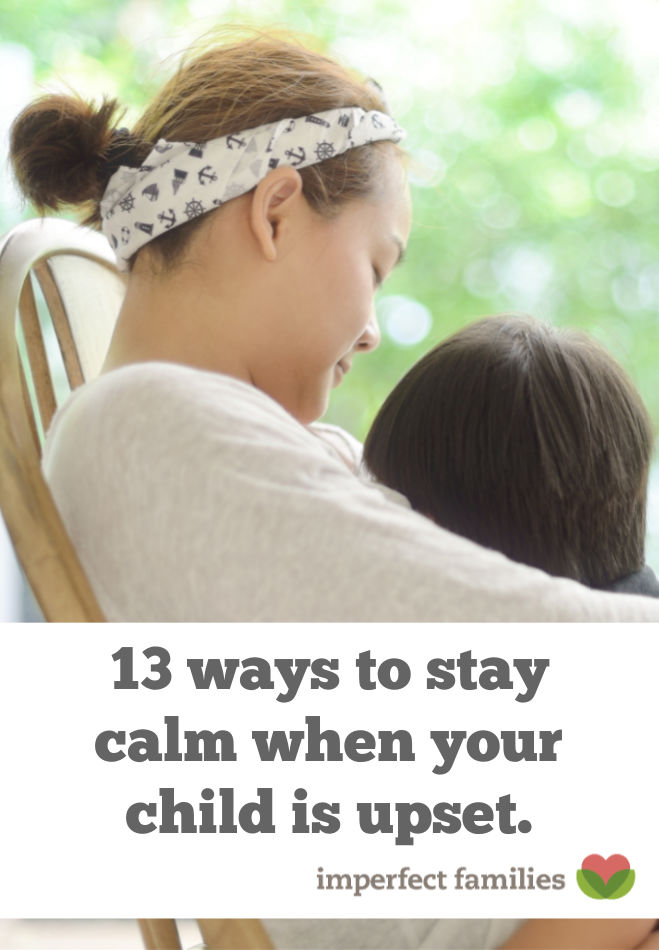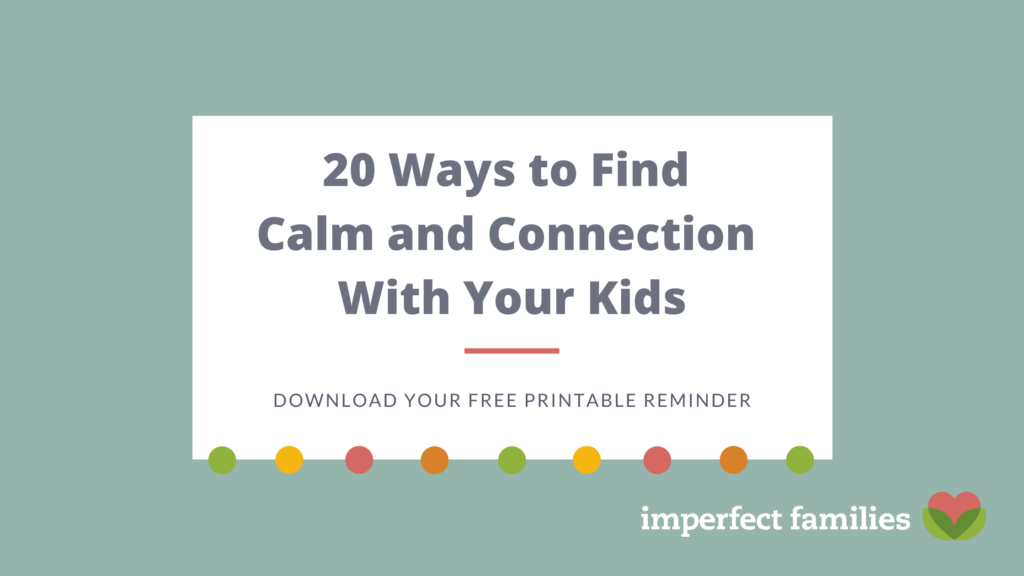It can be hard to stay calm when your child is upset, anxious, angry, or sad. Read through this list to find 13 ways to practice calm, confident parenting.

I did not start out being an especially calm, patient parent.
It took years of practice, therapy, and lots of deep breaths.
And guess what? There are still times when I lose my cool, yell, or get upset with my kids. Especially if I did not get enough sleep, if I’m feeling stressed, hungry, or generally worn out.
If you are ready to cool down your angry reactions and work on bringing a calm, confident presence into your parenting, you’re in the right place!
Learning to stay calm when your child is upset can seem overwhelming at first.
Rather than crossing your fingers and hoping you won’t resort to yelling next time, try a few things on the list below.
Don’t wait until the heat of the moment to practice! Many of these ideas can be sprinkled throughout your day, giving your brain and body a chance to absorb the new skill when you’re calm.
This means it will be easier to use when the tension rises.
Some of these ideas will work for you, some won’t. Take what is helpful and leave the rest. Or, add your own ideas to this list.
13 Ways to Stay Calm When Your Child is Upset
Meditation: Studies show that as little as 5 minutes of meditation each day can have a positive impact on your physical and mental health. Learn more here.
Repeat a Mantra: Spend a few minutes creating a positive, uplifting, honest sentence to repeat. My favorites are: “This is not an emergency.” And, “He is a good kid who is having a hard time.”
Breathing: Taking a deep breath helps your brain stay out of fight/flight/freeze mode. There are many ways to focus on your breath, here is a list for you and your kids to explore.
Pause: You may feel pressured to respond, the situation may feel urgent, or you may feel like you’re spiraling out of control. Give yourself permission to pause and slow down.
Sit Down: Change your body language by sitting in a chair or near your child. Getting below your child’s eye level can decrease their brain’s perception of threat in the moment.
Be Mindful: Rather than worrying about the future or dwelling on the past, stay centered using a 5, 4, 3, 2, 1 technique. Name 5 things you see, 4 things you hear, 3 things you touch, 2 things you smell, and 1 thing you taste.
Tapping: Some people find tapping, EFT, or Emotional Freedom Technique to be a great way to reduce stress. This article goes into more detail.
Talk Slower and Softer: Instead of ramping up, matching your child’s intensity, or raising your voice, try intentionally lowering your tone, slowing the pace, even whispering may help.
Give Yourself a Hug: Sometimes, the person who needs comfort is YOU! Self-compassion might feel like a huge step, but it can positively change the way you parent. Read more here.
Take a Drink of Water: Be intentional about walking away when you need a break. Use the act of pouring and drinking water as a way to ground you in this present moment.
Think good thoughts about your child: Your perception and assumptions matter. Challenge your thinking by reminding yourself that your child is a good kid having a hard time.
Practice a Script. Responding with empathy can help a child feel heard and understood. Create a few “scripts” to follow: “You feel so (worried, angry, disappointed).” Or, “This feels (scary, overwhelming, stressful). I’m here.”
Get Outside. There are many stress-relieving benefits to being outside. In the middle of a meltdown, you (and your child) may need this as a change of scenery, a space to breathe, or a temporary relief.
Practice Does Not Make Perfect
You can learn to stay calm when your child is upset. It is possible!
And, it may take time.
Be kind to yourself in the process.
Creating new habits and patterns doesn’t happen overnight.
It’s easy to dwell on the areas we struggle, the old habits that stick around, the times when we act in a way that isn’t respectful or positive. Rather than noticing your flaws, focus on the times when you use one of these strategies, recognize the small steps you’re taking in a positive direction.
Your goal is not perfection.
Your goal is to add more calm, confident parenting into your days. Slowly, over time. Always growing, learning, and making mistakes along the way.
If you’d like more support, learn more about Online Parent Coaching sessions.



Comments have been turned off to retain the privacy of all families. If you have a question or comment on the topic, you're always welcome to contact me.